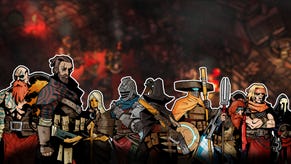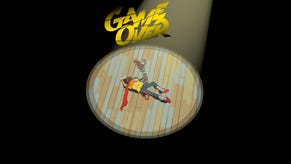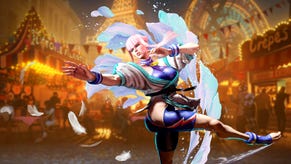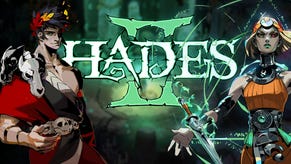2012 New Year's Resolutions: Try Something New
When was the last time you played a game that really surprised you? If you only make one resolution this New Year, make it something fun: break your bad gaming habits and try something different.
Maybe you play games to pass the time between other activities or on a commute; or maybe it's a major part of your social life. Maybe it's a hobby you take very seriously; maybe it's an art form you devote large portions of your life to analysing and dissecting. But however you game, you probably hold one or two teeny-tiny prejudices about it - and now's the perfect time to break free of them, to the benefit of us all.
What is genre, anyway?
At the dawn of the gaming era, we didn't bother with genre classifications because everything fell under the same heading - vague blobs blobbily blobbing around other blobs. If there was a genre divide, it was "trying to put your blob on other blobs" and "trying to keep your blob away from other blobs".
Games began to diversify when graphics and design skills increased, and it became useful to corral them in labels so we could explain them to each other in under ten minutes. Unlike other kinds of entertainment, which often have strict guidelines as to what defines each genre (see this excellent explanation of electronic music genres by beat, for example) we often struggled to classify games, because so many new kinds were popping up.
And then there's today, where anything you can comfortably put in one of the main genres, you could probably just as easily call "a such-and-such clone". Let's face it, if you have played one shooter, or (platformer or fighter) you've played them all. There are qualitative differences between them, and there are excellent reasons like story, community or individual features to draw you to one or another - but the core mechanisms remain the same. The games produced to vie for your dollar become more and more difficult to differentiate, and we're back to the blobs again.
So in 2012, break out of that genre mold. Play something in a different genre. You can be modest, and just spread out in your usual stomping grounds - grand strategy or MOBA, as opposed to real time strategy; cover-based third-person or shooter RPG as opposed to first-person shooter - or you can be daring, and try something we find difficult to put in a box, like the simulation-adventure-survival-RPG-sandbox Minecraft, or first-person-tower-defence Sanctum.
Dollar to fun equation
We can be terribly snobby about games. More and more evidence is piling up that traditional business models are breaking down, but check out comment threads on any new free-to-play game, and you're almost guaranteed to see at least one sneer about freemium games. You might even find similar comments when a publisher daringly releases a game on the cheap; because it doesn't cost the earth, it must be terrible.
This is just not true. Cheap simply does not necessitate nasty.
That said, even when a lower production budget does result in less shiny graphics, or a shorter play time, do you really need every experience to be a blockbuster event? Isn't there something nice about getting a few night's entertainment out of a game you bought with your pocket change, as opposed to the weeks you might get out of a major release which has to be worked into your budget? And why, if a game is good fun and you can play it for free, would you not want to do that?
You may need a stepladder to get down off your high horse after so long in the saddle, but trust me - it's not so bad down here.
Mob mentality - and exclusivity
Game sales figures are mysterious. Sometimes they seem to bear no relation to reviews, marketing, or even to common sense. Nobody is yet to figure out what really drives us to certain games over others, but there seems to be an element of momentum. Once a game starts to sell, it really, really sells, and gamers everywhere rush to get on board.
Do you know how many albums Justin Bieber has sold? How many copies of Rebecca Black's Friday were sold? Those are big numbers. Does that necessarily mean they're any good, and you should send your money their way, as opposed to something more obscure? Don't be a sheep: make informed choices based on your experience, not what your mates down the pub reckon.
On the flipside, drawing big crowds doesn't necessarily mean something is bad.There aren't actually any rules about what makes a game good fun or a worthwhile use of your time. Some critics get so caught up in hating a popular game or series that they might never get around to actually trying it - or admit that just because it's not in their taste, they haven't established any objective faults. Don't become a hipster, either.
When only the manliest will do
What matters more in a game - the gameplay, or the graphics? If you answered gameplay - as is always fashionable - then why do games with dark grey and brown palettes sell better than those with bright or pastel colour schemes? Why do you feel comfortable playing a game about shooting mutants in the head with bazookas, and not one with precisely the same mechanics about sending bundles of love to orphan unicorn babies?
In 2012, play something pink, or purple, or devoted to adorable baby faunies. Just to see if you can. Observe your hormone levels before and after. You will find them unchanged.
Platform wars
Althought many of us certainly feel the investment is justified, gaming equipment costs a lot of money. Sometimes you can only afford one of the options on the market, and once you've made that choice, you're stuck with it. In this position, it's understandable if you get a little defensive if anybody suggests there's anything even vaguely smelling of wrong with your decision; not only does it make you feel a bit silly, it could mean you've wasted your money.
But it's actually OK for there to be different strengths and weaknesses between the platforms. It's alright that companies secure different exclusives. It is perfectly acceptable that sales are stronger over here, or over there. None of this means there's anything wrong with your choice; you picked the best option for you.
So stop behaving as if the existence of other platforms is a threat to your wellbeing and buy an iPhone app. Try a browser-based PC game. Have a go on a friend's 3DS. Sneak in a few rounds of Wii Tennis with your grandma. Touch a PS3 control pad without screaming "ooh err yuk the Xbox 360 pad is better". Indulging in these activities - even, gosh, enjoying them - does not mean you need to hand in your fanboy badge. It just means you're better informed about your own preferences when it comes time to invest again, and maybe - just maybe - you'll be able to better understand differences of opinion.
If everyone changed their gaming habits in 2012, we'd achieve so much. Comment threads could become places of meaningful discussion and debate rather than barely literate cat fights in rock, paper, scissors style. Publishers could take more chances on diverse games, leading to faster evolution of the industry. Hostility to those with different tastes would cease. World peace would occur overnight, jellybeans would rain from the sky and dogs would marry cats.
There are still enough holiday hangover sales going on - and friends with too many games on their plates - that you can probably pick up something new and different on the cheap. So what are you waiting for?













